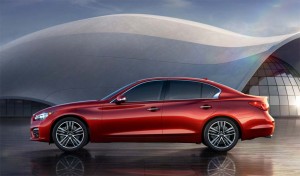For a while now, Nissan Motor Co. has been more or less defined by the huge bet on electric vehicles placed by Chief Executive Officer Carlos Ghosn.
Nissan executives insist their electric vehicle initiative is doing fine but the company is actively pursuing bigger goals, ranging from expanding the global reach of its premium Infiniti Brand to supplying taxis to New York City to bolstering its position in the commercial vehicle market around the world.
Meanwhile, Nissan’s sales have roughly doubled since 1999 when it was forced to turn for help to the French carmaker Renault, a partnership that ultimately led it back to financial health.
But it’s Nissan’s high-stakes investment in battery-car technology that’s drawing the spotlight these days. The Japanese maker, which is celebrating its 80th birthday this year, has positioned itself as the industry’s leader in electric vehicles, having sold more than 75,000 Leaf battery cars since the vehicles introduction in 2010.
During a lengthy session — dubbed Nissan 360 — in Southern California, Nissan officials pointed out their emphasis on technology is not limited to battery power. The new Infiniti Q50 is a good example, the 2014 sedan offering the world’s first drive-by-wire system, a critical first step in the move towards autonomous vehicles. With other new safety features, Nissan said it expects to reduce by more than half the number of fatalities in its vehicles by the end of the current decade.
Roel de Vries, corporate vice president of marketing communications and brand strategy, said Nissan is making steady progress on “Power 88” which envisions raising the company’s overall profit margin and global market share to 8% by the end of the fourth quarter of 2016. At the same time, the all-electric Leaf is boosting Nissan’s image as a technologically capable company.
In fact, the Leaf has become one of the 10 best selling vehicles in San Francisco and also does well sales-wise in Los Angeles and in Atlanta.
Nissan is the fastest growing automotive brand, according to Interbrand and is on track to set a sales record in the U.S. this year thanks to the introduction of five new models over the past 15 months. The makers hopes to maintain its momentum by introducing 51 new vehicles and 90 new technologies over the next several years, de Vries said.
With help from its alliance partner, Renault, Nissan has succeeded in maintaining its flexibility. For example, while it doesn’t build its own diesel engines, it offer diesels from Renault in several of its commercials vehicles and passenger cars such as the European version of the new Versa Note.
Shiro Nakamura, Nissan’s chief creative officer, conceded there are other innovative companies in the auto industry and there are a number of companies that deliver excitement. But it is much more difficult for an auto company to deliver innovation and excitement for a broad audience, Nakamura said.
Innovation is going to be particularly critical for Infiniti, which has long been seen as little more than a Tier II luxury brand largely limited to the U.S. market.
“Our mission is to challenge the status quo. There is no doubt we are a challenger brand,” said Johan de Nysschen, who said Infiniti is expanding into new markets and new vehicles built with the passion, precision and performance demanded by young luxury buyers.
“We are going after the young-minded,” added de Nysschen, noting the new premium compact vehicle Infiniti will show in Frankfurt next month will embody the emerging spirit of the brand.
Nissan also made an effort to revamp the company’s line of light commercial vehicles, which now account for more than 20% of the automaker’s sales worldwide.
The company’s push into the light commercial vehicle market will get a lift this fall with the introduction of the first Nissan-designed New York City taxi. Production of the Nissan NV200 Taxi – New York’s “Taxi of Tomorrow” – is now underway at the company’s assembly plant in Cuernavaca, Mexico.
Nissan developed the new taxi, which is based on the NV200 compact cargo vehicle, to suit the specific demands of people who ride in New York City taxicabs every day after a competitive two-year selection process, the Taxi and Limousine Commission of New York City selected Nissan NV200 as the exclusive taxi for the city – though that choice is still being challenged by some in the city’s taxi business.
The New York City Taxi is one of the most visible vehicles in the world and the contract with New York opens the door to selling the taxi in other cities in North America, a Nissan spokesman said.


I’ve owned many Nissan cars, beginning with a Datsun 411 in grad school, but only have a 90’s 300ZX now, in a permanent spot next to my first car, an MGA. Nissan clearly is a great company – just the upgrade of the 350ZX to the 370ZX proves that. But here I see mostly Versa models and little else. At our house in Italy, I see tons of Micra models, but also many Quashqai+2 models (Rogue in the US, though the +2 7-seat isn’t sold here) with the strong turbodiesel which would be huge hit here. Nissan needs already has the tools to be a “challenge” manufacturer, it just needs to use them.